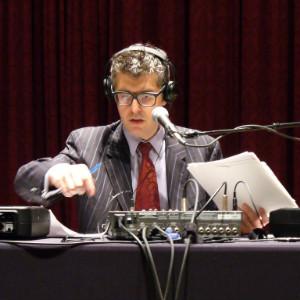As the acclaimed and celebrated presenter of This American Life – a radio program that has some 1.7 million weekly listeners across America and internationally – Glass’ radio-perfect voice is often the only feature audiences have access to. It made this live appearance a highly anticipated indulgence, though Glass chose to begin the night backstage, which preserved, as he put it, the ‘intimacy’ of radio. Not being seen can be amazing, and it’s one of his favourite things about radio, he explained.
Triple J presenter Fenella Kernebone introduced the evening, and was able to enthusiastically advise us that one episode of Glass’ show is exactly the right length for a car trip from Sydney to Wollongong. Kernebone, herself a well-known radio presenter, described Glass as a master storyteller, and This American Life as one of the most inspirational radio shows of our generation.
In the first few minutes, it emerged where Glass’ delightful nature originates. He cited his aims as a storyteller to bring across “points of view never heard anywhere else” and ones that are simply “fun to listen to”.
In the western world, news and media is often focused on very sombre, depressing themes. Glass feels that although these are truths to be told they only show half the picture. Life also includes a lot of joy; a lot of very simple, happy things to get excited about. And without those things, he says, reporting is just plain dull. And he’s not interested in boring stories – for instance, this meant creating a happy-go-lucky story about which snacks were most or least popular on a US aircraft carrier during the Iraq war (Snickers, for the record; but they couldn’t get rid of the Fruit Chews).
That said, Glass doesn’t discount seriousness. His only problem with it is that seriousness and humor seem to be in separate worlds, that “they never touch” in the news. It’s one dimensional – and that’s what he likes to do differently. He illustrated his point by playing a story about a man’s trip to the zoo that started out like a comedy, where all the divorced parents see their own lives playing out through the animals. But quite unexpectedly, the story turned and ended with a poignant, deep thought about the enigmatic quality of love throughout our lives.
Glass has another entertaining attribute, which probably contributes to his youthful demeanor: his inventive use of language. The spoken word is his forte, his art form and instrument. It’s as if the English language is moldable clay; he uses it in its pure form, but changes its shape where needed, and chisels his tool to the finest, sharpest point.
Telling the story of a Rabbi whose sermons he used to love listening to as a kid, he recalled that the man was quite a character. He was from Brooklyn, “like a Jew on TV. He was just … so … Jewie!” Not only did we immediately understand his meaning, we were also in stitches. Uproarious, witty genius in one snappy second.
This perfectly reiterated the point Glass made several times about his storytelling secrets: a good story asks lots of questions, but the best stories answer them all in a single, meaningful sentence or word. The body of a story can contain the most mundane facts but if they’re strung together like “a moving train” – if events “happen and happen and happen…” – it makes things much “fascinating-er!”
He also cleverly (but in the simplest way) set a seductive tone for the evening by playing music softly in the background while talking. Later, he had no qualms sharing his belief that without music he’s “just some guy talking”, but with music – carefully chosen to be not so interesting as to steal audience attention! – “suddenly everything [he says] sounds smarter.”
Though he made the creation of his stories sound like a breeze, in the Q&A at the end it came to light that Glass and his crew are probably working on around 25 stories at a time, of which three or four will make it to air. As he artfully put it, “to get hit by lightning every week, you have to walk around in the rain a lot.”
Ira Glass is an engaging conversationalist, journalist, artist and storyteller. It’s little wonder his Sydney Festival appearances sold out so quickly. If you didn’t get to see him live, check out the free weekly podcast of This American Life.
Rating: 4.5 out of 5 stars
Reinventing Radio: An Evening with Ira Glass
Sydney Town Hall
January 11, 2012
Also appearing:
Thursday, January 12, 2012 — Brisbane. Powerhouse Theatre.
Friday, January 13, 2012 — Perth. Astor Theatre.
Sunday, January 15, 2012 — Adelaide. Dunstan Playhouse.
Monday, January 16, 2012 — Melbourne. Athenaeum.





